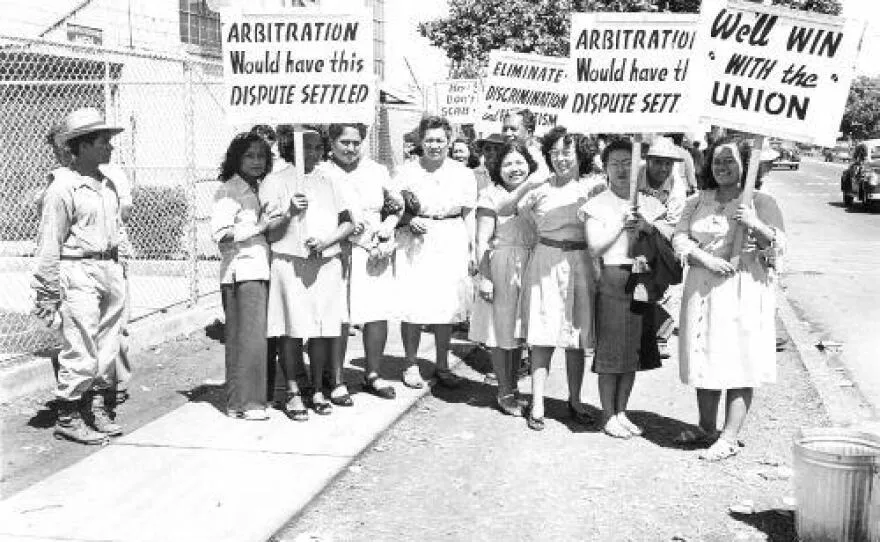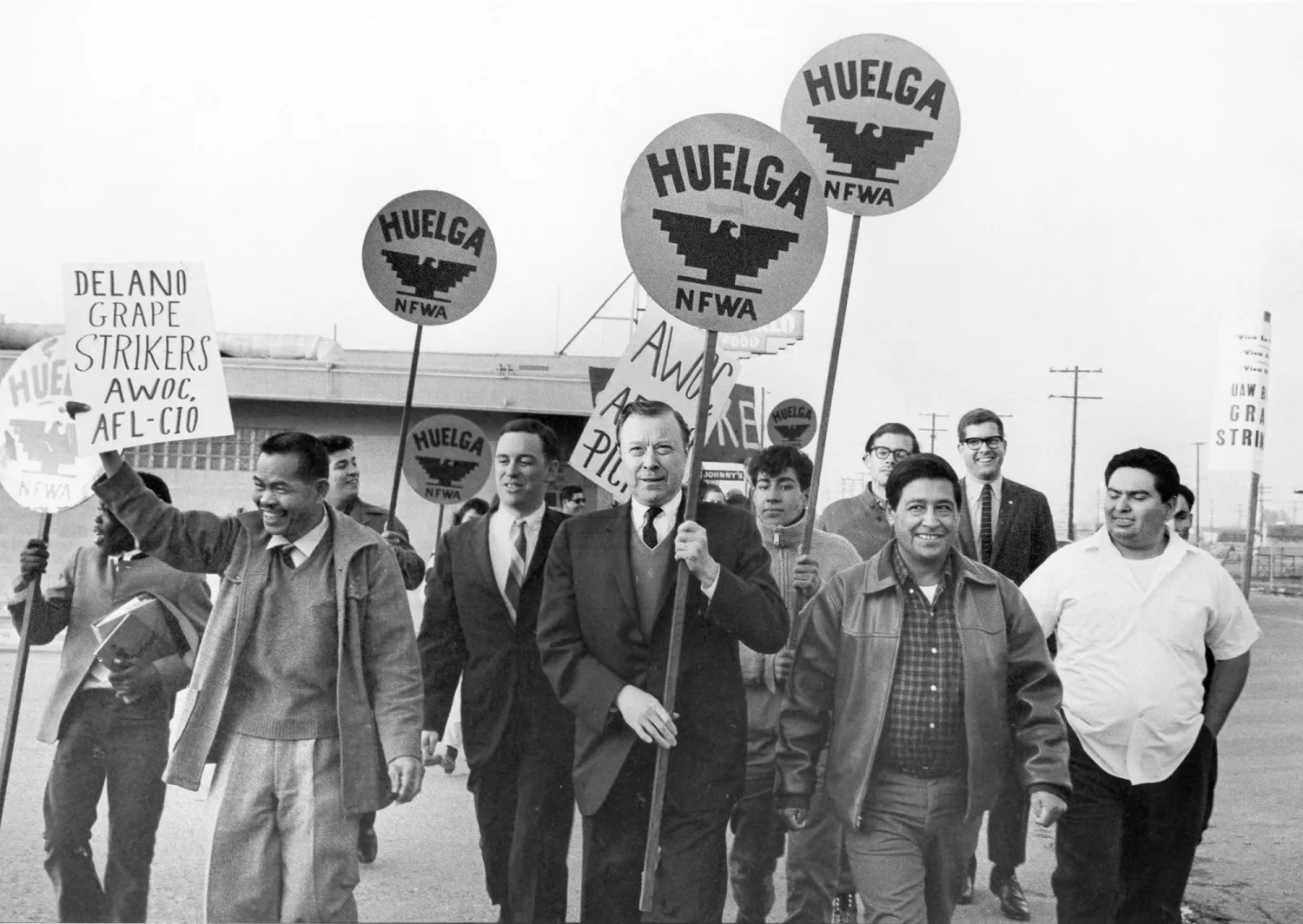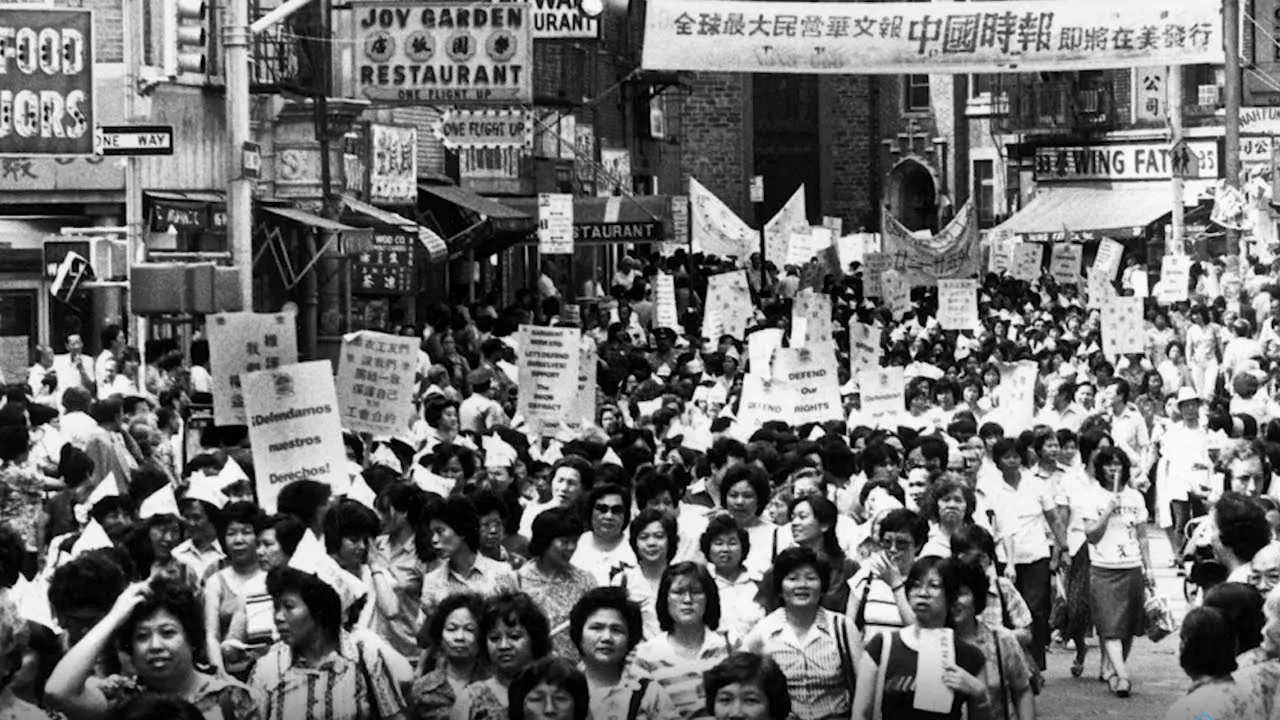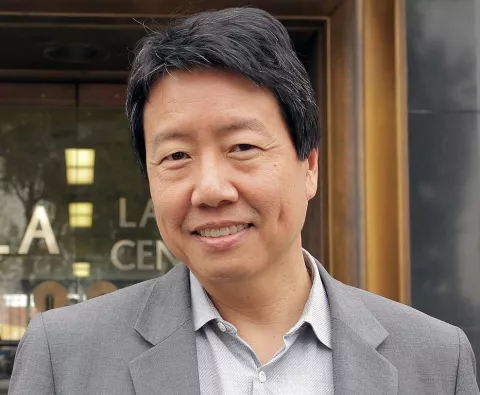In May, our nation celebrates Asian American, Native Hawaiian, and Pacific Islander (AANHPI) Heritage Month. The AANHPI community has played an essential role in American culture, diversity, and the economy. At NEA, we recognize the essential role members of the AAPI community have played as active leaders in labor movements, calling for improvements to labor conditions, an increase in wages and worker benefits. As a result of these heroic community members, substantial change has been made.
Here are three things to know about the work done by AANHPI community members—past and present— to fight for justice for workers and union members nationwide.
Hawai’i: 1946 – The Sugar Strike

On August 31, 1946, over 26,000 sugar workers refused to report to their jobs, shutting down all but one of the 34 sugar plantations across Hawai’ian islands—one of the most expensive strikes in history.
The strike was organized by the International Longshore and Warehouse Union as a protest to poor working conditions, lack of benefits, and employee mistreatment fueled by an economy that had been historically controlled by colonial powers.
By 1946, one-fifth of the Hawai’ian population, roughly 100,000 people, lived and worked on sugar plantations. With a diverse population of employees, including Chinese, Japanese, Korean and Filipino workers, the ILWU made inclusivity a key part of their campaign, ensuring representative leadership in the strike committee and conducting multi-lingual meetings.
The organization of a diverse movement proved to be a success. After 79 days of striking, the ILWU secured housing, medical, pensions, and wage benefits for workers.
Today, Hawai’i’s workforce represents the second-highest union density in the nation with 21.9 percent of employees being represented by a union. Ultimately, the 1946 Sugar Strike transformed the social and economic climate of Hawai’i and improved working conditions across the region.
California: 1969 – The Delano Grape Strike

On September 8, 1965, 2,000 Filipino American farm workers refused to report to their jobs picking grapes in the valley north of Bakersfield, California. This movement was organized by Larry Itliong of the Agricultural Workers Organizing Committee (AWOC), a predominantly Filipino union. Itliong and worker’s had one main goal – better working conditions for grape farmers.
About two weeks later, the National Farm Workers Association (NFWA), a group of Mexican American farmworkers led by Cesar Chavez and Dolores Huerta, joined the AWOC strike. Together, AWOC and NFWA formed what would be known as the United Farm Workers (UFW).
UFW was determined to win—and after five years of striking and an international grape boycott, the Delano Grape Strikers prevailed. New contracts were signed in 1970.
In the wake of the Delano Grape Strike’s success, Itliong formed a legacy of activism within his community. He resigned from the UFW in 1971 under the belief that the union lacked support for aging Filipino American farm workers. He was an elected delegate at the 1972 Democratic National Convention and oversaw the development of housing for retired Filipino farm workers. His initial involvement in the Delano Grape strike and lifelong activism represents the role of Filipino Americans within the farm labor movement—the stories that have often gone untold.
New York City, Chinatown: 1982 – The Garment Strike

On June 24, 1982, over 20,000 garment workers gathered in Columbus Park in New York City’s Chinatown. These workers—predominantly Chinese American women—rallied to demand better working conditions and liveable wages.
The strike was organized by the International Ladies Garment Workers Union and was set in motion after contractors refused to renew union contracts that asked workers to give up already scarce benefits.
Holding signs that said, “Union workers: Let’s defend ourselves. Support the union contract,” “In union, there is strength,” and “Defend our rights,” tens of thousands of workers marched through the streets of Chinatown, demonstrating the power they held over the city’s economy and garment industry. The sight of togetherness and strength led contractors to fold. Only a few days after the strike began, contractors agreed to sign the union contracts.
The 1982 Chinatown garment strike was a historic victory, providing higher wages and benefits for tens of thousands of workers in the city and amplifying Asian American voices. Garment workers transformed the economic conditions of an industry that historically exploited them, changing the future of the labor movement.
What’s Next for AAPI Leaders and Laborers?

Even as historical changes have been made, more work needs to be done to ensure equity and justice for all AAPI people. Modern AAPI labor leaders continue to strive for justice. Here are just a few of them:
Ai-jen Poo is the co-founder and president of the National Domestic Workers Alliance (NDWA). The NDWA works toward achieving respect, recognition and labor protections for domestic workers across the country, most of which are women of color.
With 70 affiliate grassroots organizations and seven local chapters, the NDWA is successfully organizing and making tangible change for domestic care workers across the country. Impacts include winning 12 Domestic Worker Bills of Rights, organizing workers, developing policies and mobilizing voters.

Kent Wong is the director of UCLA Labor Center, where he teaches courses in labor studies and Asian American studies. He previously served as staff attorney for the Service Employees International Union. He was the founding president of the Asian Pacific American Labor Alliance and of the United Association for Labor Education and is currently vice president of the California Federation of Teachers.
The Asian Pacific American Labor Alliance, APALA, AFL-CIO, was founded in 1992 allowing API workers, union members, and allies to make strides in advancing immigrant, labor and civil rights. APALA is a strong representation of efforts in modern AAPI labor movements with 22 chapters and pre-chapters and a national office in Washington D.C.

Arlene Inouye is a passionate union leader, educator and winner of NEA's 2023 Ellison S. Onizuka Memorial Award. She currently serves as the United Teachers Los Angeles (UTLA) secretary and on countless other boards, promoting labor rights and the AAPI community. Inouye has taken part in organizing and participating in strikes that amplify social and racial justice within local school systems.
In March of 2023, UTLA and SEIU Local 99, which represented more than 30,000 school faculty, joined together to rally. Both were negotiating new contracts with LAUSD. As a result of unification and collective organizing, major victories were won in the strike.
The cultural and economic impacts from the AAPI community are evident. By recognizing the changes that still have to be made, we are able to address these issues and continue to uplift those affected.
Use Your Educator Voice.
